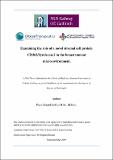| dc.contributor.advisor | O'Brien, Timothy | |
| dc.contributor.advisor | Elliman, Stephen | |
| dc.contributor.advisor | Barkley, Laura | |
| dc.contributor.author | Loftus, Paul Gerard | |
| dc.date.accessioned | 2019-09-12T12:08:46Z | |
| dc.date.available | 2019-09-12T12:08:46Z | |
| dc.date.issued | 2019-09-04 | |
| dc.identifier.uri | http://hdl.handle.net/10379/15428 | |
| dc.description.abstract | Tumour-associated stromal cells play a key role in initiating and sustaining tumour growth, metastasis, immune control and chemo-resistance. Thus, identifying stromal proteins that contribute to carcinogenesis may open new therapeutic paradigms.
We have identified Syndecan-2 (SDC2/CD362) as a novel antigen for identification of stromal cells (SC) from breast cancer tissue. SDC2 is a cell surface heparan sulfate proteoglycan that has been shown to be elevated in breast and other cancers. We demonstrate that SDC2+ SC and SDC2+ epithelial cells are present in murine and human breast tumours by flow cytometry and that levels of SDC2 are elevated in the sera of triple negative breast cancer patients. ShRNA knockdown of SDC2 in MDA-MB-231 triple negative breast cancer cells (BCC) inhibits TGFβ-induced markers of epithelial to mesenchymal transition (EMT) and BCC migration. Knocking down SDC2 in primary human tumour-derived SC also limits TGFβ signalling, inhibiting the ability of SC to suppress T cell proliferation. Our data indicates that modulation of SDC2 in human tumour-derived SC significantly alters tumour carcinogenesis in a xenograft orthotopic breast cancer model. Thus we hypothesise SDC2 is a functional protein within the tumour microenvironment (TME) promoting tumour growth, migration and immune-suppression; and therefore therapeutic targeting of SDC2 may yield a novel treatment for breast cancer. To that end, we generated novel SDC2 peptides that inhibit the clonogenic survival, migration and TGFβ-induced EMT of BCC in vitro. In addition, SDC2 peptides inhibit the immune suppressive properties of SC and this correlates with a decrease in expression of immune suppressive mediators CXCR4 and PD-L1. Importantly, SDC2 peptides display anti-tumourigenic properties in vivo as overexpression of a SDC2 peptide in SC within the TME reduces breast carcinogenesis in both xenograft and syngeneic mouse models. | en_IE |
| dc.publisher | NUI Galway | |
| dc.rights | Attribution-NonCommercial-NoDerivs 3.0 Ireland | |
| dc.rights.uri | https://creativecommons.org/licenses/by-nc-nd/3.0/ie/ | |
| dc.subject | Breast Cancer | en_IE |
| dc.subject | CD362 | en_IE |
| dc.subject | Syndecan-2 | en_IE |
| dc.subject | Mesenchymal Stromal Cell | en_IE |
| dc.subject | MSC | en_IE |
| dc.title | Examining the role of a novel stromal cell protein CD362/Syndecan-2 in the breast tumour microenvironment. | en_IE |
| dc.type | Thesis | en |
| dc.contributor.funder | Irish Research Council | en_IE |
| dc.local.note | A small group of cells called stromal cells play a key role in initiating and sustaining tumour growth and metastasis in cancer. Therefore discovering ways of identifying and targeting these cells may work to combat the spread of cancer.
We have identified a new protein SDC2 on stromal cells (SC) from breast cancer tissue. SDC2 has been shown to be elevated in breast and other cancers. We show here that SDC2 is present on cells from mouse and human breast tumours and that levels of SDC2 are increased in blood samples from patients with aggressive breast cancer. We also show blocking SDC2 in breast cancer inhibits key cancer promoting pathways and slows tumour growth in a breast cancer model. We therefore hypothesise SDC2 is an important protein within tumours as it promotes tumour growth, and metastases and therefore therapeutic blocking of SDC2 may yield a new treatment for breast cancer. To that end, we generated SDC2 blockers that inhibit the key cancer promoting pathways seen before. Importantly, these SDC2 blockers work in mouse models of breast cancer and slow tumour growth and metastases. | en_IE |
| dc.local.final | Yes | en_IE |
| dcterms.project | info:eu-repo/grantAgreement/SFI/SFI-IRC Employment Based PhD Fellowships/14/PSS/02/IE/Employment Awards/ | en_IE |
| nui.item.downloads | 323 | |


